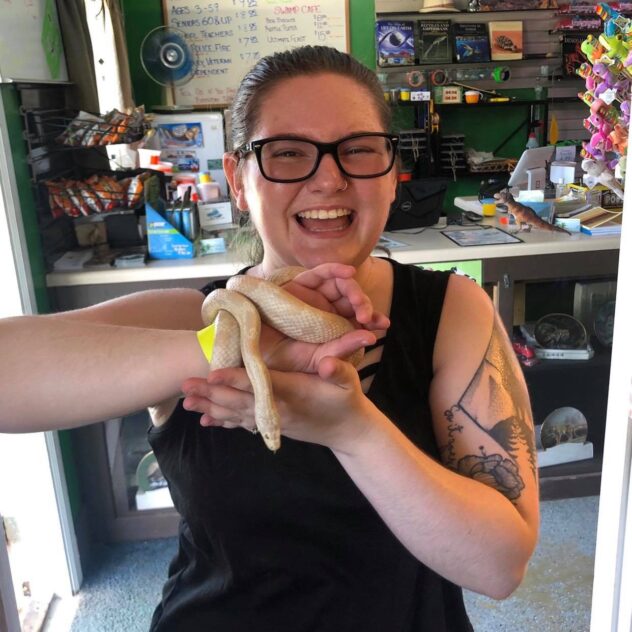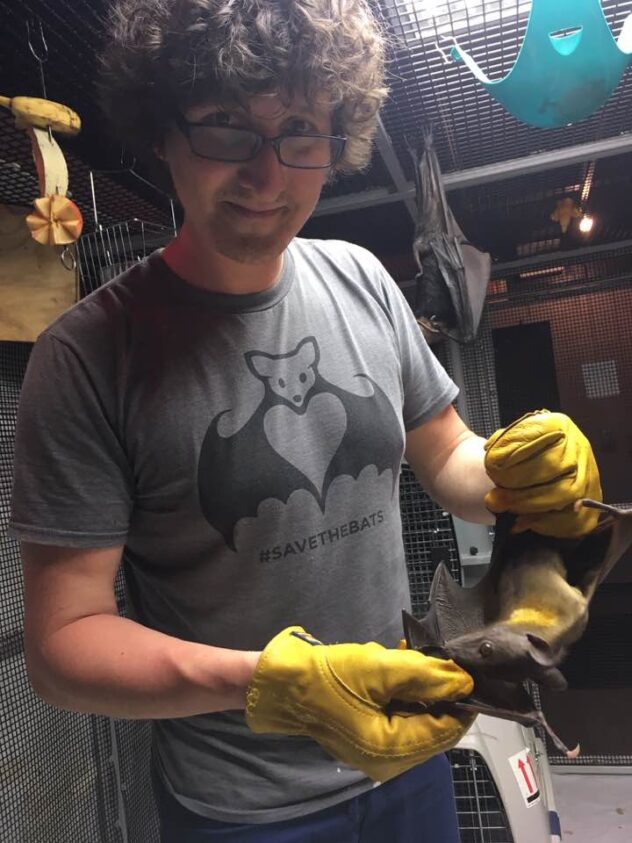Our Mission
The Bat Association of MSU is a registered student organization at Michigan State University. Our mission is to provide space for students to learn about bats and to help the community better understand and appreciate the important role bats play in our ecosystem.
Meet Our Executive Board
Amanda Curton- President
Amanda is an undergraduate student at Michigan State University hoping to graduate with a degree in Environmental Biology in May 2022. She is passionate about sustainable living, animal welfare, and the conservation of vulnerable species - particularly bats, small mammals, and reptiles! In her spare time, she enjoys reading Stephen King novels, cooking plant-based meals, camping, watching nature documentaries, and spending time with her partner and two cats - Jack and Kitty.

Amanda, President
Peter Folwer- Treasurer
Peter recently received his DVM from Michigan State University with a focus on Public Health and One Health. He is currently pursuing a PhD in Comparative Medicine and Integrative Biology focusing on diseases of honey bees, but his true love is bats.

Peter, Treasurer
Carolyn Graham- Secretary
Carolyn is a PhD student in the Plant Biology Department and the Ecology, Evolution, and Behavior program at MSU, studying plant evolution and species interactions. She also did her undergraduate at MSU where she majored in biochemistry. She finds bats fascinating because they are incredibly diverse - in fact, about 25% of all mammal species are bats! Bats are also incredibly important parts of many ecosystems, and many have very cool interactions with plants. She has been a part of BAM for about a year and looks forward to participating in more bat-related research and education in the future.

Carolyn, Secretary
Elizabeth Litwin- Community Outreach
Elizabeth is an undergraduate student studying Fisheries and Wildlife at MSU. She is passionate about bats, birds of prey, reptiles, and citizen science. Outside of school, she competes on the USA Archery team and travels to as many public lands as she can.

Elizabeth, Community Outreach

Our Shared Values
As a group we support the One Health model, understanding that the health of our community is intimately linked with the health of our ecosystem. One Health is a worldwide strategy for expanding interdisciplinary collaborations and communications in all aspects of health care for humans, animals and environment. Bat conservation has a large role to play in this effort for a number of reasons.
Sustainable Agriculture Practices
Recent research has shown that the load of insects bats eat here in the United States saves the agriculture industry billions annually by keeping harmful insect populations in check. They are now understood to serve an important role in new approaches to integrative pest management.
Human and Animal Health
In addition to agricultural pests, bats also help keep other insect disease vectors like mosquitos in check. By reducing the number of mosquitos, they help reduce the spread of a number of human and animal diseases including West Nile Virus and heartworm which is still widespread in the United States.
Habitat Restoration
Wildlife conservation efforts play an important role in public safety. Wild animals like bats are more likely to come into contact with the public when they are displaced from their natural environment. Through conservation efforts like building and placing bat houses, we can help mediate these risks and provide these wild animals with a safe place to raise their young.
Why Bats?
Bats make up the largest number of any mammalian species. With over 1200 species identified so far, 1 in every 5 species of mammal is a bat. Their ability to fly has given them the unique ability to speciate and adapt to a huge variety of environmental conditions. From the smallest mammal in the world, the bumblebee bat, to the fastest animal on earth, the Mexican free-tail bat, bats present us with a tremendous amount of insight into the evolutionary process.
Bats are also crucial for seed dispersal and pollination. Their ability to fly means that they can carry fruit seeds long distances. As pollinators, they are crucial for a wide variety of fruit production including bananas, cocoa, mangoes, papaya, and agave necessary to make tequila.
Michigan is home to 9 species of bat, including the endangered Indiana bat. These bats play an important role in controlling local insect population. Their value in controlling agricultural pests is increasingly being appreciated as a part of integrated pest management strategies. Conserving these species is especially important with the threat of White Nose Syndrome, a fungus spreading to colonies across the country. Most recent research about the prevalence of this disease in Michigan can be found in our resources section along with the Department of Natural Resources strategy for the management.
Battle For Bats: Surviving White Nose Syndrome from Ravenswood Media on Vimeo.